The advent of flight booking apps has brought about a significant shift in our rapidly paced society. These convenient applications serve as personal travel companions rendering trip planning and booking more effortless than ever before. The struggle to navigate complex airline websites or endure lengthy phone calls with customer service is now a thing of the past. With just a few taps on your smartphone, you can effortlessly secure flight bookings at any time and from any location.
Due to the popularity of these apps, there is a tremendous opportunity to create a unique flight booking app using bespoke mobile app development services and thrive on demand.
This article will explore everything about the process of building flight booking apps, the associated cost, and the must-have features. Before we dive into the article, let’s look at some online flight booking and travel industry statistics.
Online Flight Booking App Statistics:
According to reports, flight booking apps are gaining significant popularity as this market grows with a CAGR of around 9.0% from 2022 to 2030.
The global online travel market was worth around $955.76 million in 2022, and it’s all set to touch the mark of approximately $1915.6 million by the end of 2030.
Online ticket sales will generate around 73% of the total tourism revenue by the end of 2026.
The provided statistics serve as undeniable proof that flight booking apps have become a permanent fixture and are projected to thrive even further. Consequently, entrepreneurs can take full advantage of this propitious situation. For those considering using custom mobile app development services with the objective of building a customized flight booking app, read on as we explore the reasons behind the continuing growth of this trend.
Why Do More Travelers Prefer To Book Flights By Themselves?
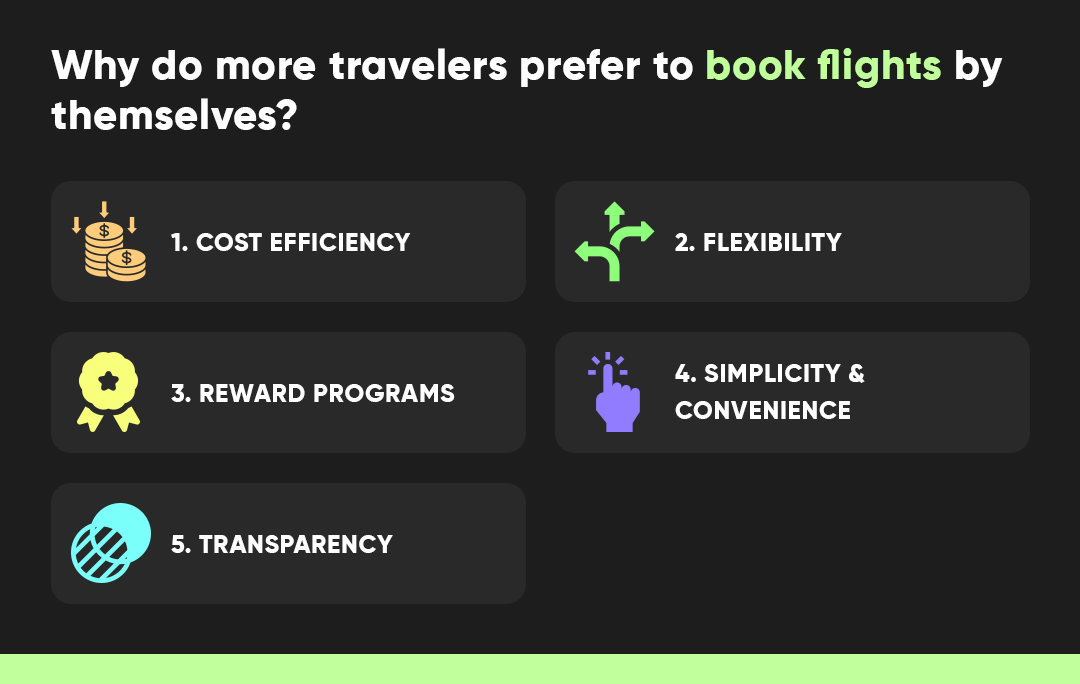
Cost Efficiency:
Direct booking frequently offers chances to grab excellent offers and discounts. Travelers can evaluate costs on different platforms and select the most economical choice. Additionally, it does away with any third-party charges that might be applied when using a travel app development company.
Flexibility:
In this ever-changing journey called life, travel plans often mirror its unpredictability. Luckily, individuals who take control of managing their flight bookings are presented with the invaluable ability to adapt and adjust their itinerary whenever necessary. From impromptu date changes to longing for an indulgent upgrade to business class, travelers hold the power to modify their arrangements as per their desires.
Reward Programs:
Airline loyalty schemes are available to frequent travelers. Users who book directly through an airline’s website can accrue points that can be used for future trips, seat upgrades, or other special advantages.
Simplicity and Convenience:
The availability and accessibility provided by digital technology have greatly simplified the process of reserving flights. At any given time, travelers are able to reserve their seats without leaving their homes, thanks to this newfound convenience. It is clear that such ease has had a significant impact on the increasing preference for self-booking among those who travel.
Transparency:
Direct flight bookings allow passengers to view all fees upfront. There are no unforeseen costs or surprises, which offers a sense of transparency that most tourists value.
After this, let’s focus on the top flight booking app development cost aspects so that you can plan things better and get the maximum ROI.
Factors Influencing The Cost Of Flight Booking App Development:
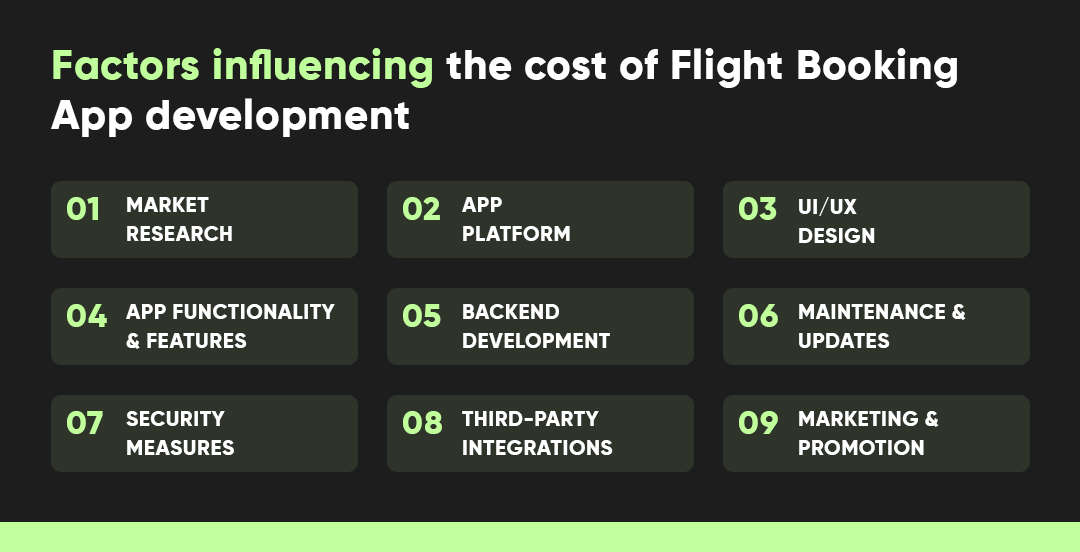
Market Research:
Before beginning the design or development process, it is essential to conduct a comprehensive market analysis. This will involve gaining a deep understanding of the requirements of your target audience, studying your competition, and staying up to date with the latest trends in the flight booking industry. These factors will directly influence the features and user interface of your app, ultimately affecting the overall cost involved.
App Platform:
The decision between iOS, Android, or a cross-platform solution significantly influences the cost. Each platform has specific coding language requirements and app submission requirements. Initially, opting for cross-platform software may seem more budget-friendly, but it may lack the same functionality and user experience as native apps.
User Interface and User Experience (UI/UX) Design:
App design is more than simply aesthetics. It’s about designing a simple user experience that makes booking flights easy. Because expert designers are needed for high-quality UI/UX design, the price of development goes up.
App Functionality and Features:
Basic features such as search, booking, and payment are crucial. However, in order to differentiate yourself, it might be necessary to incorporate advanced features such as price comparison, real-time notifications, loyalty programs, and integration with other services like hotels and car rentals. It is important to note that the incorporation of additional features also brings about increased complexity and, subsequently, higher costs.
Backend Development:
The magic takes place right here. The backend enables your app to manage bookings, process payments, and process thousands of user requests. Cost is impacted because building a reliable, scalable backend requires a lot of effort and experience.
Maintenance and Updates:
After your app is launched, it is important to regularly update it in order to address any bugs and enhance its performance. Many people tend to overlook this continual expense; however, it is vital to ensure that your app remains up-to-date and maintains its competitive edge.
Security Measures:
Apps for booking flights must have strong security measures because they handle sensitive user data and financial transactions. The cost of development may go up if high-level encryption is used and data protection laws are followed.
Third-party Integrations:
Integrating third-party APIs for payments, maps, or airline databases adds to the cost. These integrations can offer useful functionality, but they also take more development time.

Marketing and Promotion:
Developing an app is a notable accomplishment, but ensuring its popularity among users is a separate challenge altogether. Crafting successful marketing strategies to promote your app within a competitive market may contribute to extra expenses for your budget.
Creating an app requires a substantial investment, but when done well, it can generate sizable rewards. It’s crucial to strike a balance between the pricing and the value the app offers its customers. Understanding the procedure for creating a custom flight booking app is crucial after investigating the price of flight booking app development. Therefore, we will go over every necessary step to help you construct a reliable flight booking app in the next part.
Technology Stack for Flight Booking Apps Development:
Backend Frameworks: Node.js and Ruby on Rails:
The backbone of any app is its backend. Node.js, with its non-blocking, event-driven architecture, excels at handling concurrent requests, making it ideal for flight booking apps that need to manage multiple user queries simultaneously. Similarly, Ruby on Rails, with its emphasis on convention over configuration, allows developers to build robust and scalable applications quickly.
Frontend Libraries: React and Angular:
The user interface is the face of your application. React, with its virtual DOM, ensures smooth and fast rendering of user interfaces. On the other hand, Angular, with its two-way data binding, facilitates seamless data synchronization between model and view.
Database Management: MySQL and MongoDB:
Effective data management is crucial in flight booking apps. MySQL, a relational database, is proficient in handling structured data. In contrast, MongoDB, a NoSQL database, provides flexibility in storing unstructured data, which can be beneficial when dealing with different types of user data and flight information.
Cloud Services: AWS and Google Cloud:
Cloud services are an essential part of the technology stack. AWS offers a broad set of global cloud-based products including storage, databases, analytics, and machine learning. Similarly, Google Cloud provides a suite of cloud computing services that run on the same infrastructure that Google uses internally for its end-user products.
Payment Gateways: Stripe and PayPal:
To handle transactions, secure and reliable payment gateways are necessary. Stripe provides a powerful API and other functionalities for dealing with complex financial transactions. PayPal, a globally recognized payment system, offers fraud protection services and easy integration with various platforms.
APIs and Integrations: Skyscanner and Expedia:
APIs provide access to third-party resources. Skyscanner and Expedia APIs allow your app to tap into their vast resources of flight data, giving your users access to a wide variety of flights and prices. Now, let’s explore how to develop a bespoke flight booking app.
How to Develop a Custom Flight Booking App: A Detailed Journey
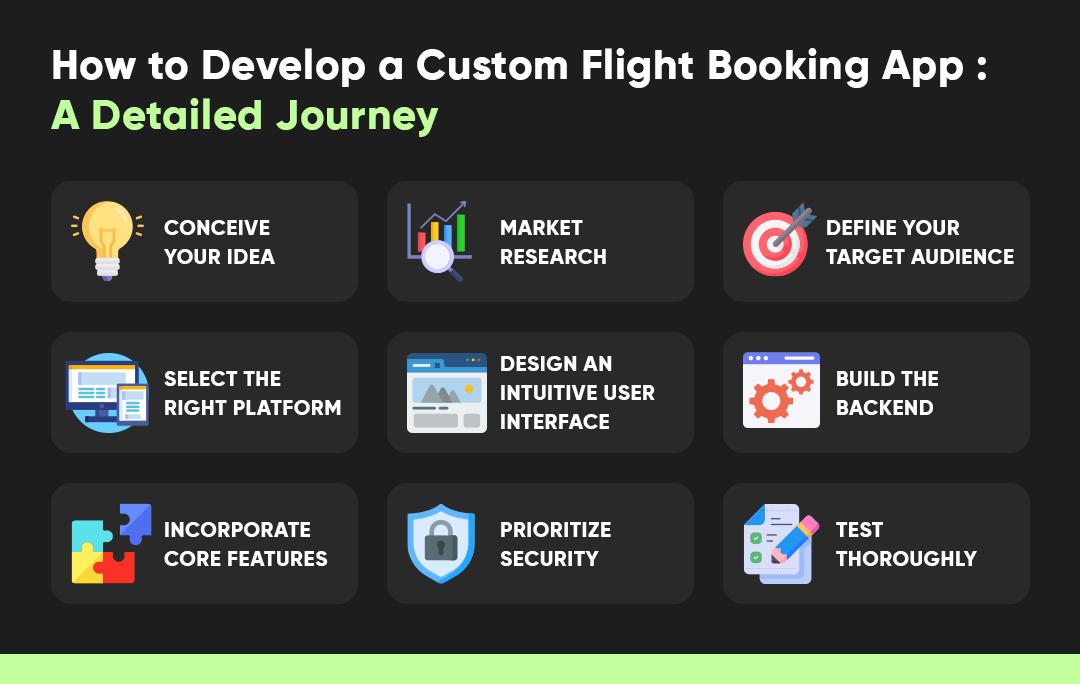
Conceive Your Idea:
The process of creating a personalized flight booking app starts with a distinct idea. This idea is not just any ordinary idea but rather one that sets it apart from the competition. It entails finding a unique selling proposition (USP) that distinguishes your app from others in the market. Are you interested in providing last-minute deals, or are you considering incorporating a rewards program for frequent flyers? Whatever it may be. Make sure it resonates with your intended audience and fulfills an unaddressed requirement.
Market Research:
Once you have a good idea, you should conduct extensive market research. This entails comprehending the competitive environment, spotting possible rivals, and evaluating their advantages and disadvantages. Furthermore, you need to know what features your potential clients search for in flight booking software. Is it real-time updates, intuitive navigation, or a wide range of filter options? Your ability to make wise decisions during development will increase as your market knowledge grows.
Define Your Target Audience:
It’s essential to know who your app is for. Are you targeting business travelers, backpackers, or family vacationers? Each demographic will have different needs and preferences when booking flights. Understanding your audience will help you prioritize features and ensure your app meets their requirements.
Select the Right Platform:
When considering whether to build your app for Android, iOS, or both, it is crucial to remember that this decision has a profound impact on your app’s overall reach and performance. To make an informed choice, consider your target audience’s preferences and the technical benefits each platform offers. For example, if most of your audience uses Android devices, it would be sensible to consider developing an Android app as a starting point.
Design an Intuitive User Interface (UI):
Any app’s success depends on having a user interface that is interesting and simple to use. Users should have as little hassle as possible while searching for flights, comparing costs, and making travel arrangements. Additionally, the design must be eye-catching, using fonts and colors consistent with your company identity.
Build the Backend:
The backend acts as the engine that powers your app, managing tasks such as database management, server-side logic, and user authentication. It is crucial to ensure that your backend is strong and able to support the front-end functionalities smoothly.
Incorporate Core Features:
Users have certain expectations for a flight booking app. These include looking for flights, evaluating airfares, purchasing tickets, getting alerts about bargains and flight status, and contacting customer service. Make sure your flight booking app uses these features to its full potential.
Prioritize Security:
When handling highly sensitive credit card information and personal details, security cannot be disregarded. By putting advanced security measures in place, such as encryption and secure protocols, you can protect your users’ information and foster confidence.
Test Thoroughly:
Before launching your app to the market, it is essential to undergo thorough testing procedures for identifying and resolving any potential bugs or performance challenges. This diligent approach should cover various dimensions of the application’s functionality, usability, and as well as its overall security. Through careful execution of this critical phase, you can be certain to provide a seamless and truly satisfactory user experience following the official launch of your app.
A unique flight booking app must be created with careful planning, execution, and ongoing development. However, by knowing your target market, emphasizing the user experience, and committing to frequent updates, you may make an app that genuinely stands out. Choosing the best mobile app development company, like AGS, is essential for the process to run smoothly. Consider the necessary and desirable features when creating your flight booking application.
Must-have Features For Your Flight Booking App:
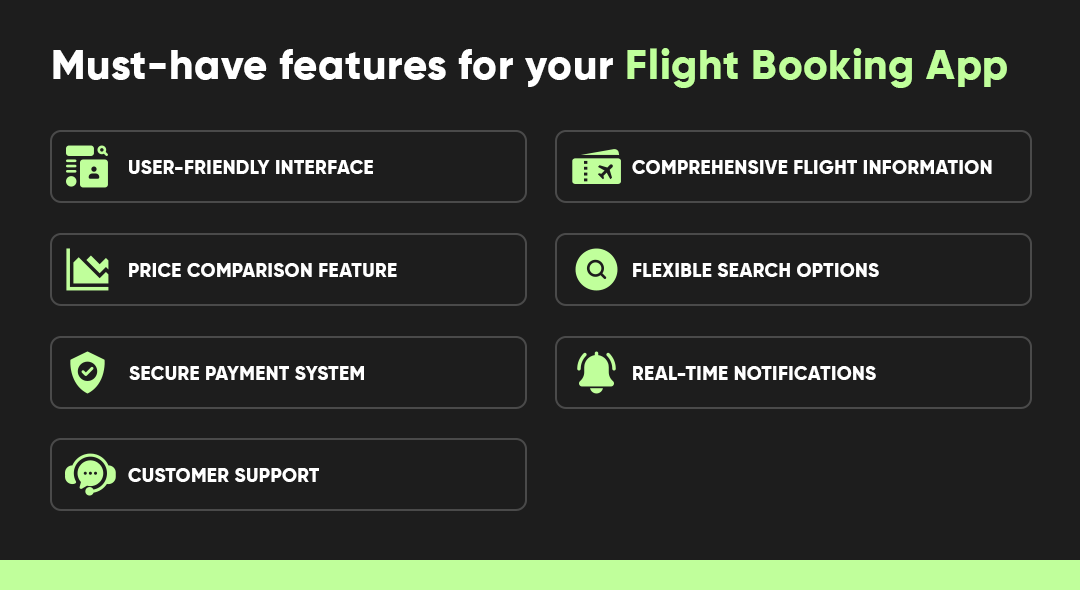
User-Friendly Interface:
The interface is the foundational element of a successful app. It is crucial for it to be user-friendly, easy to navigate, and cater to users of varying levels of technical knowledge. A meticulously crafted interface can distinguish between a frustrating user experience and a smooth flight booking process.
Comprehensive Flight Information:
Each flight should have full information available on your app. This contains flight duration, layovers, departure and arrival timings, and airline information. Users gain confidence to make judgments with greater details.
Price Comparison Feature:
Your app should give customers the ability to compare flight costs in a world where getting the best deal is crucial. Users’ overall experience can be improved by using this feature to assist them in getting the greatest deals.
Flexible Search Options:
Catering to the preferences of travelers is essential. Therefore it is important to provide a variety of search options. This can be achieved by allowing users to search for flights based on factors such as price, duration, or specific airlines. By offering this range of choices, both those with fixed plans and those who are more flexible can find what they are looking for.
Secure Payment System:
Never let security be compromised; thus, include a reliable payment gateway that guards user information and guarantees safe transactions.
Real-Time Notifications:
Provide users with up-to-the-minute flight updates. A timely message about a flight schedule change or a check-in reminder can greatly improve the user experience.
Customer Support:
It is crucial to ensure that your app delivers efficient customer support. Whether dealing with queries, addressing complaints, or acknowledging feedback, offering readily available and responsive customer service can significantly boost user satisfaction and foster loyalty.
Keep in mind that an app’s success depends on its features and how well they meet user needs. Aim for simplicity and complexity in equal measure to make your app both feature-rich and easy to use. Check out different types of business models ideal for flight ticket booking app development
Types of Business Models Available for Flight Tickets Booking App Development:
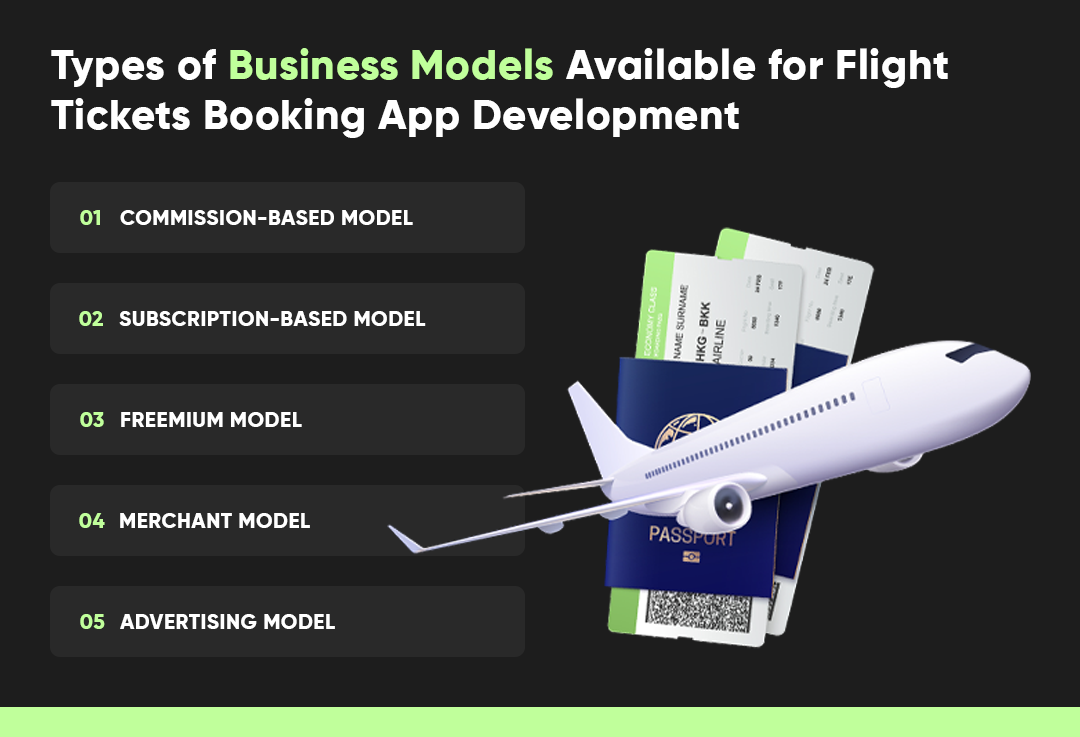
Commission-Based Model:
This is the most common business model for flight booking apps. The app acts as an intermediary between the airline and the customer. For every booking made through the app, the app owner receives a commission from the airline.
Subscription-Based Model:
In this model, customers pay a monthly or yearly fee to gain access to exclusive deals and discounts. This model can generate consistent revenue and build customer loyalty, as subscribers are more likely to use the service repeatedly.
Freemium Model:
This model offers basic services for free while charging for premium features. For example, users might be able to search for flights and view prices for free but must pay to access features such as price alerts or flexible date calendars.
Merchant Model:
Under this model, the app owner buys seats in bulk from airlines at negotiated prices, then resells them to customers. The profit comes from the difference between the wholesale and retail prices. This model requires substantial upfront investment and carries more risk, but also has the potential for higher returns.
Advertising Model:
This model generates revenue by displaying advertisements within the app. These could be ads for related services such as hotels, car rentals, or travel insurance. The app owner gets paid either based on the number of ad views or clicks, or when a user makes a purchase after clicking an ad. On this note, let’s look at some key monetization methods available for flight booking apps.
Monetization Methods For Flight Booking Apps:
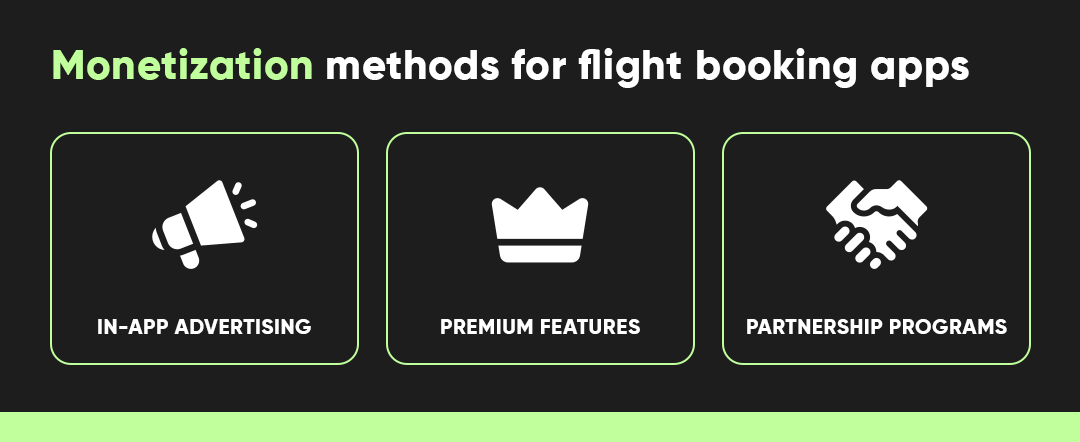
In-App Advertising:
Imagine having a vibrant airport terminal right at your fingertips! Flight booking applications have the opportunity to collaborate with relevant businesses, such as luggage brands or travel insurance companies, in order to showcase precise advertisements. This arrangement proves advantageous for all parties involved: advertisers can effectively reach a captivated audience while the applications generate substantial revenue.
Premium Features:
Flight apps can offer enhanced features for a small fee. Think priority booking during peak seasons, personalized travel recommendations, or access to exclusive airport lounges. These premium elements not only boost revenue but also enhance user satisfaction.
Partnership Programs:
Join forces with fellow sky navigators! By partnering with airlines, hotels, or car rental services apps can earn a commission for every booking made through their platform. The strategy broadens the user’s convenience while boosting the app’s bottom line.
It’s important to work with an experienced app development company to ensure you gain an edge over other players. With their expertise and insights into the development process, you can optimize your app for success.
How Much Does It Cost To Build a Custom Flight Booking App?
Developing a custom flight booking application requires a significant investment, which can vary depending on various factors. The complexity of the app, the features it offers, and the location of the development team all play a role in determining the cost. The price range for such a project is quite broad, ranging from $10,000 to $200,000.
If you opt for a basic flight booking app with essential features and a simple design, you can expect to spend between $10,000 and $50,000. However, if you wish to create a more advanced app with additional features like itinerary management, push notifications, and loyalty program integration, the cost will be higher. Developing an MVP will cost between $10K to $45K, and adding advanced features will cost between $45K to $200K.
It’s vital to keep in mind that these are average figures and that actual costs may change based on the particular needs of your project. The price of creating a unique flight booking app depends on how much money you have to spend and what features you want. On this note, let’s look at why you should hire AGS for your custom flight booking app development.
Why Hire Auxano Global Services For Flight Booking App Development?
Embarking on the journey of developing a flight booking app? Consider Auxano Global Services, a beacon in the vast sea of software development. Our expertise is not just limited to creating functional apps; we are known for crafting unique travel solutions that resonate with users. Imagine an app that’s not just about booking flights but one that encapsulates the entire travel experience – planning, booking, and managing – all under one virtual roof.

We are the best flight booking app development company with agile methodologies, dedicated team members, and the latest technology stack to deliver aesthetically appealing designs. We are not just developers; we are your technology partners.
Wrapping Up!
A flight booking app’s development involves thoughtful preparation and execution. User preferences, design trends, technical needs, and other aspects need to be taken into account. To ensure a successful launch, it’s crucial to make use of the skills of a seasoned app development business. Concerning costs, the precise budget for development depends on a number of variables, like the complexity of the app, its functionality, its design components, etc.
Frequently Asked Questions
-
1. What are the key steps in developing a flight booking app?
Developing a flight booking app involves several steps. First is the discovery phase, where you identify your target audience and market needs. Next is the design phase, where you plan the user interface and experience. The third step is development, where the actual coding and creation of the app occur. Finally, there’s a quality check and stationing phase to ensure the app functions as expected.
-
2. How much does it cost to develop a flight booking app?
The cost of developing a flight booking app can vary greatly, depending on numerous factors. These may include the complexity of the app, the features included, the region where the development team is based, and more. As a rough estimate, the cost can range from $40,000 to $200,000.
-
3. What features should a flight booking app include?
A flight booking app should provide users with a seamless experience. This can be achieved by including features like simple navigation, real-time flight tracking, an easy booking process, multiple payment options, personalized notifications, and customer support.
-
4. Is flight booking app development a worthy investment?
With the increasing reliance of people on mobile apps for their travel needs, investing in flight booking app development can indeed be beneficial. It can offer business growth opportunities, especially if the app is designed to address specific customer requirements and offers a unique value proposition
-
5. How can I ensure the quality of my flight booking app?
Ensuring the quality of your app involves rigorous testing and quality assurance processes. It’s crucial to identify and fix any bugs before the app goes live. Additionally, gathering user feedback post-launch can also help in making necessary improvements and updates.





![Angular Vs. Rеact: What to Choose For Your Blockchain App? [2024]](https://www.auxanoglobalservices.com/agsresources/wp-content/uploads/2023/11/Front.png)
